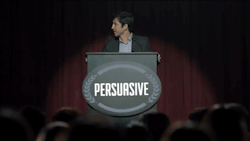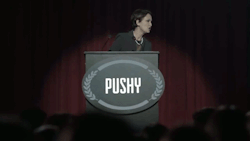"It's easy to think that social problems must come down to flaws in individual character. If we have a drug problem, it must be because individuals just can't or won't say "no." If there are racism, sexism, heterosexism, classism, and other forms of privilege and oppression, it must be because of people who for some reason have the personal "need" to behave in racist, sexist, and other oppressive ways" (9-10).This is a very basic way to explain how individualism exists in multiple systems of oppression and how it infiltrates every aspect of our lives. From here, it is easy to see how one could entirely miss the systematic nature of oppression and how it stretches beyond merely the occasionally blip of a psychopath in an otherwise neutral sea of humanity. It is easy to say that everyone is inherently good, to shift the question of oppression from a larger system and onto an individual, making conversations about oppressive systems easily derailed. Especially when conversation turns to internalized racism, sexism and so on, which are harder to detect because they slip under the radar that spotlights mouthpiece bigots (most famously, politicians). Focusing on these people is pointless when trying to dismantle the entire system.
"If we think about the world this way--which is especially common in the United States--then it's easy to see why members of privileged groups become upset when they're asked to look at the benefits that go along with belonging to that particular group and the price those benefits require other groups to pay. When women, for example, talk about how sexism affects them, individualistic thinking encourages men to hear this as a personal accusation: "If women are oppressed, then I'm an evil oppressor who wants to oppress them." Since no man wants to see himself as a bad person, and since most men probably don't consciously intend to act in oppressive ways toward women, men may feel unfairly attacked" (10).This is how countless discussions about oppression are derailed by those occupying privileged groups. "Not all men are like that" is a phrase I see most common when women are discussing merely their experiences--and almost always someone (gender aside) will state, unnecessarily, that "all men are not like that," shifting the focus away from a clearly systematic (patriarchal) cause of oppression onto the individual "hurt" feelings of men caused by "bitching" women. Then the discussion is turned toward the oppressed and blame of these "hurt" feelings takes precedence over the topic of original conversation. I have even witnessed the most patient try to explain time and time again, "I am not saying all men, I am not intending to attack you individually" and so on--even detailing how systematic oppression works--only to be written off as "angry" as much of feminism, unfortunately, is. This gif set comes to mind when thinking about how the actions of an individual are warped to match the definitions society has in place for oppressed groups.









source: http://mary-read.tk/post/69243231107/pantene-phillippines-whipit-labels-against-women
"Rather than stop and ask how the economic system itself sets us up to feel insecure, the path of least resistance is to work hard to establish our own private zones of safety within an insecure system. The easiest thing for people to do then is to hang on to whatever they have and leave everyone else to fend for themselves" (29).This brings to mind graphs detailing wages vs. productivity over the years. With the economy failing the masses (but not those on top) there is not a mass movement significant enough that examines the shortcomings of the system. Instead, the underpaid masses are working more to survive--whether that be taking on more hours or finding another job in addition to one they already have. While physically this is not "easy," it is easier to do than examine the way the system is set up to fail the workers but not the CEOs. And even while I, myself, feel conscious of this, I am still working as hard as I can just to make rent at the end of the month. At the end of the day, it is hard to find the energy to give to another who is suffering in the same or worse conditions. The system is set up to exhaust us and to fail us, offering up all profits to those comfortably on the top.
Chapter Two: Culture: Symbols, Ideas, and the Stuff of Life
"My "freedom" to want a car is shaped by an economic system that depends on ever-expanding markets and rising profits, both of which depend on encouraging people to measure their lives more by the products and services they consume than, say, spiritual enlightenment or helping people less well-off than they are, setting us up to see the accumulation of material wealth as an essential part of a happy and successful life" (51).Because success is largely defined (by our culture) as having "a lot of stuff" or at the very least "certain kinds of stuff" (i.e. standard of living) having freedom in this area is a paradox. Desires for these kinds of things are shaped by the system of capitalism that depends greatly on their existence. It is not that people (Americans, in this case) are greedy--but rather that the system of capitalism depends on the desire for the accumulation of objects to attain a comfortable life. While a "solution" to this in the average self help book would be to live with as little "comforts" as possible, it fails to address the root of the issue: the structural conditioning in place that shapes the way we interact with our world.
"When blacks or women express anger at discrimination in the workplace, for example, they risk triggering stereotypes of blacks and women as overly emotional and therefore out of control and needing to be controlled by others. This, in turn, is used to argue that they're unsuited for higher positions because they don't display appropriate attitudes" (65).This is the double-bind for the oppressed. In order to move up in the workplace, one must be "assertive"--which is really just a nice way of saying "aggressive." This is a trait carefully rendered and bestowed upon white males and this is the only place that it is (culturally) praised. Subconsciously, those who are not a part of this privileged group will try to tap into this assertiveness when they want to be taken seriously. This is what feeds the "bitchy woman" or the "scary black" stereotypes--which is enough to keep these oppressed groups "in their place." However, when these groups are not assertive in order to obey the "rules" of social race and gender roles, it is shown as evidence to justify an imbalance of rewards (too weak to be a leader, too lazy). When oppressed groups try to fight back against this kind of discrimination, it is written off as being stereotypically "black" or "a woman" and rage against systematic equality is written off as the anger of the individual.
"Those who own and control the mass media have a vested interest in preserving and promoting capitalism as an economic system. They have little to gain and a considerable amount to lose by suggesting there might be something wrong with it. This makes them unlikely to question or undermine what makes their power and privilege possible" (69).This is what I wish I could bang over the heads of my family members over and over again until they stop believing everything they hear on the news, or using the news to shape their Global understanding. There is this widespread lack of understanding that news media outlets are owned by someone--that they receive money from some larger group with a larger interest and that this shapes what information goes out (nevermind government censors). The News is not innocent. Not even the more "liberal" stations.





0 thoughts:
Post a Comment